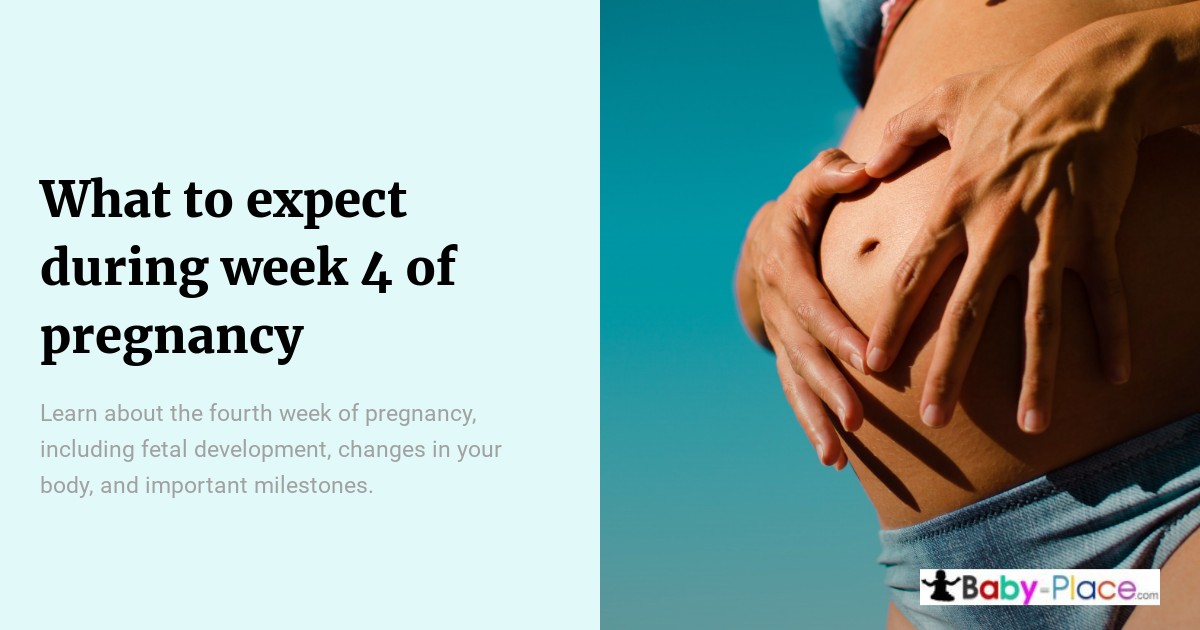Week 4 of pregnancy is an exciting time for expecting parents. During this time, many physical and mental changes occur in the mother’s body as well as developmental transformations within the fetus.
In particular, week four marks an important point in embryonic development when cell differentiation begins to take shape. As cells start forming distinct structures such as organs and limbs, it is essential that mothers-to-be are aware of how these processes affect them both physically and emotionally.
This article will provide detailed information on the expected physiological, psychological, and fetal developments that occur during week four of pregnancy.
Overview Of Week 4
Week 4 of pregnancy marks the beginning of major changes in a woman’s body. As the saying goes, “The early bird catches the worm,” week 4 is when many important physiological processes begin to take place.
During this time, implantation bleeding may occur as the fertilized egg burrows into the endometrium and an amniotic sac begin to form around it.
Cells that makeup what will become the placenta also start developing at this stage and human chorionic gonadotropin (hCG) levels increase significantly.
Pregnancy symptoms such as morning sickness, fatigue, increased urination frequency, tender breasts, and food cravings can all be experienced during week 4. However, these signs do not necessarily indicate pregnancy since they are similar to premenstrual symptoms. If any of these signs persist for more than a few days or the menstrual period does not arrive by the anticipated date, then it is advisable to consult a medical practitioner for proper diagnosis and treatment.
Common Symptoms Of Pregnancy
During week 4 of pregnancy, it is common to experience a variety of symptoms associated with early pregnancy. One of the earliest and most common signs of pregnancy is an increase in the production of the human chorionic gonadotropin (hCG) hormone. An increased level of this hormone will cause morning sickness, which can include nausea and vomiting.
Other possible symptoms during this time may include breast tenderness, fatigue, headaches, or constipation due to changes in hormones.
In addition to changes related to hCG levels, taking prenatal vitamins at this stage also helps promote healthy fetal growth and development. Prenatal vitamins typically contain folic acid and iron which both contribute to healthy cell division among other benefits. It is recommended that pregnant women take 400 micrograms of folic acid daily from either their diet or through supplements as soon as they know they are expecting.
Iron should also be taken regularly throughout the entire duration of the pregnancy as well as after birth while breastfeeding to ensure adequate red blood cell formation and oxygen delivery to the baby’s organs.
Early Miscarriage Risks
Miscarriage is a heartbreaking reality for many couples embarking on the journey of parenthood. During week 4 of pregnancy, it is important to understand the risks associated with early loss. The primary causes of miscarriage in early pregnancy include:
- Genetic Abnormalities:
- Chromosomal Abnormalities
- Excessive Alcohol Consumption
- Hormonal Imbalances
- Uterine/Cervical Issues:
- Uterine Fibroids
- Cervical Incompetence
- Infections and Diseases:
- Chlamydia
- Rubella (German Measles)
In addition to understanding the potential risk factors that can lead to an early miscarriage, women should also be aware of other types of pregnancy losses such as ectopic pregnancies or molar pregnancies.
An ectopic pregnancy occurs when an embryo implants outside of the uterus, while a molar pregnancy involves abnormal cells instead of a fetus forming within the uterus after conception.
Taking steps to ensure a healthy pregnancy by avoiding any known risk factors and following your doctor’s advice will help reduce the possibility of experiencing an early loss.
Signs Of Early Pregnancy
Ultrasound imaging during week four of gestation will show evidence of fetal pole development, which includes visualization of the yolk sac within the gestational sac alongside embryonic cardiac activity. The presence of both structures confirms an intrauterine location with viable embryo growth inside the uterus rather than outside it in an ectopic pregnancy.
Missing a period and increased urinary frequency are among the first signs of pregnancy while more detailed images through ultrasound technology will confirm successful intrauterine implantation with visible cardiac activity along with a growing yolk sac being present within the gestational sac.
Mayo Clinic Guidance On Pregnancy
Week four of pregnancy is a crucial time for the fetus’s development and the mother’s health. During this week, the Mayo Clinic recommends that pregnant women:
- Attend their first prenatal appointment with their healthcare provider
- Get an ultrasound scan to confirm gestational age and check on fetal growth
- Begin taking prenatal vitamins to ensure proper nutrition for both mother and baby
- Be screened for spina bifida and other birth defects through blood tests or ultrasounds scans
- Watch closely for signs of missed menstrual period, morning sickness, and fatigue
- Monitor sexual activity to reduce the risk of infection
The Role Of Hormones During Pregnancy
The role of hormones during pregnancy is a significant factor in the development of an unborn baby. During week four of pregnancy, hormone levels begin to rise and play a major part in fetal growth. It is important to be aware of what changes can occur during this time so that expectant mothers can have realistic expectations of their bodies as well as the fetus’s progress.
Hormones such as human chorionic gonadotropin (hCG), estrogen, progesterone, prolactin, relaxin, and others are responsible for various physiological processes necessary for establishing and maintaining a healthy pregnancy. hCG increases rapidly at the beginning of week four and reaches its peak by week eight or nine; it then slowly decreases until birth.
The purpose of hCG is to support the placenta which provides oxygen and nutrients to the developing fetus. Estrogen helps prepare the mother’s body for childbirth while also increasing blood flow to the uterus lining.
Progesterone maintains pregnancy by preventing contractions from occurring too early. Prolactin produces breast milk throughout lactation whereas relaxin loosens ligaments between bones in preparation for delivery. All these hormones work together to ensure successful gestation until birth occurs.
In addition to hormonal activity, other physical changes take place during week four; these include increased urination due to pressure on the bladder caused by enlargement of the uterus, tenderness in breasts due to faster cell division in mammary glands, fatigue due to higher demands placed on organs like heart and lungs plus morning sickness may develop because of elevated hormone levels.
Dietary Changes For A Healthy Pregnancy
At week four of pregnancy, it is important to make dietary changes in order to ensure a healthy pregnancy. Nutrition plays an integral role during this time, as the fetus undergoes major development and growth. Women should strive for:
- A balanced diet with plenty of fruits, vegetables, grains, and protein sources
- Healthy fats such as avocados and olive oil
- Adequate hydration with water or other low-sugar drinks
To help meet nutritional needs while pregnant, women should increase their intake by 300 calories per day. Additionally, prenatal vitamins can supplement any nutrients that may be lacking from a woman’s current diet.
Herbal Remedies And Over-The-Counter Treatments
By week four of pregnancy, a woman may begin to experience common symptoms such as nausea, vomiting, and fatigue. In the pursuit of relief from these symptoms, some women turn to herbal remedies or over-the-counter treatments for help. While it is important to discuss any use of herbs or medications with one’s healthcare provider beforehand, there are certain options that can be used safely during this stage of pregnancy.
Herbal teas like ginger tea have been known to relieve morning sickness. Over-the-counter antacids such as Tums and Rolaids can alleviate heartburn while Preggie Pops lollipops contain ingredients like Vitamin B6 which can reduce nausea. Many prenatal vitamins also include Vitamin B6 which helps combat morning sickness in addition to providing an array of other benefits for mother and baby alike.
Prescription Medications During Pregnancy
During week 4 of pregnancy, it is important to be aware of the potential need for prescription medications. In some cases, a medical provider may prescribe medication to address certain conditions related to the mother’s health or that of her developing fetus. It is essential that pregnant women discuss any current and future prescribed medications with their healthcare providers before taking them as many over-the-counter drugs are not safe during pregnancy.
It is also necessary to review all instructions carefully regarding dosage and frequency of use when using any type of prescribed medicines or vitamins. Women should avoid self-medicating unless instructed by their healthcare provider, as doing so can potentially interfere with other treatments or cause unnecessary harm to both mother and child. When in doubt about the safety of any drug, mothers should contact their doctor or pharmacist for further information prior to taking anything.
Natural Hormone Therapy For Expectant Mothers
Though there are some potential risks associated with natural hormone therapy for expectant mothers, the benefits greatly outweigh them. Hormones play an important role in a woman’s pregnancy and it is beneficial to supplement these hormones during this time to ensure that everything progresses as planned.
Natural hormone therapies involve taking supplements or adjusting dietary habits to provide optimal levels of essential hormones throughout the duration of one’s pregnancy. These methods have been proven effective in helping women achieve their desired outcomes, such as reducing nausea and fatigue, promoting regular contractions during labor, and improving overall mood.
Impact On Long-Term Health For Mother And Fetus
At this stage of pregnancy, there is potential for long-term effects on the health of both mother and fetus. The most significant issue that may arise during week four is the development of gestational diabetes in the mother which can lead to an increased risk for developing type 2 diabetes later in life.
Additionally, as the placenta begins forming and supplying nutrients to the fetus, it increases the likelihood that certain birth defects such as neural tube defects or congenital heart problems will develop.
Conclusion
The fourth week of pregnancy is a pivotal time during which many changes occur. The fetus develops rapidly, the mother experiences a wide variety of symptoms and the risk of early miscarriage increases. It is important to be aware of signs of early pregnancy, as well as potential medical interventions that may be necessary.
While some women find joy in selecting baby names and researching prescription medications for use while pregnant, others require more serious medical attention such as surgery or natural hormone therapy. Regardless of each woman’s individual situation, it is essential to consider the long-term health implications for both mother and child associated with this stage in development.
In conclusion, although the fourth week can present unique challenges for expectant mothers, knowledge, and understanding are key components in ensuring a healthy outcome for all involved – from the selection of baby names to consider the impact on long-term health. With proper care and monitoring throughout pregnancy, individuals can rest assured knowing they have done everything possible to prepare their family for a successful future together.













